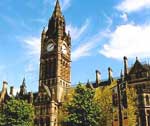 Devo Manc now looks unstoppable: last week another £6bn of National Health Service spending was slated for devolution to Greater Manchester’s new mayor and local councils. It is the latest in a tsunami of devolution from Whitehall, SW1, to Manchester Town Hall (pictured)
Devo Manc now looks unstoppable: last week another £6bn of National Health Service spending was slated for devolution to Greater Manchester’s new mayor and local councils. It is the latest in a tsunami of devolution from Whitehall, SW1, to Manchester Town Hall (pictured)
More power could follow. But could other UK city regions also be in line for serious devolution? The chances are not much better than 50-50, says Colin Talbot, professor of government at Manchester University and leader of the policy@manchester think tank.
Talbot argues that Manchester and (already devolved) London are natural units of government, thanks to a mix of history, economics and politics. The other UK city regions don’t have the same coherence.
“What’s happening in Manchester doesn’t read off easily to other regions because it is so unlike other UK cities,” he says.
Manchester grew in the 19th century as a spoke-and-hub system with surrounding towns supporting the centre. Since then interdependence has grown, says Talbot, while eccentric local government boundaries put many obvious Manchester locations into surrounding districts (Old Trafford, home of Manchester United, is not in the City of Manchester).
“The 10 Manchester boroughs are all about the same size, so no one can dominate. It’s a huge structural difference, which makes Manchester much like London and not like the West Midlands, where Birmingham is so much bigger than its neighbours,” he says.
“Pretty much everyone regards themselves as living in Manchester, even if technically they don’t. In other big UK cities, districts are much less happy to be absorbed like this.”
As a result, Manchester’s 10 borough and city council leaders have long been forced to co-operate.
Talbot says: “Manchester is getting devolution because it already has stable city-region-wide government – and that is not true for other city regions except London.”
Politics has also played its part. Chancellor of the Exchequer George Osborne represents a constituency at the heart of the Manchester commuter belt. And Manchester council leaders have learned to be highly co-operative. Even outlying boroughs like Wigan and Bolton have been made to feel they win benefits by working together.
Progress in other city regions is slow because local rivalries die hard and the history of co-operation is weaker. In December Coventry council leader Ann Lucas said she would never allow the city to become part of a Greater Birmingham and floated the idea of linking up with suburban Warwickshire instead. Despite the Manchester announcements, Coventry council says it believed nothing had changed.
Things are moving faster elsewhere. Last year combined city region authorities were established in South Yorkshire (around Sheffield) and West Yorkshire (around Leeds). Liverpool City Region’s combined authority stretches into the Cheshire borough of Halton, while the North East Combined Authority includes Newcastle, Sunderland, County Durham and Northumberland.
Property observers hope these regions can follow Manchester. Bill Hughes, head of real assets at Legal & General Investment Management, says: “Both London and Manchester have shown the way in terms of visionary leadership and commitment. Ambition and leadership already exist in Sheffield, Leeds, Newcastle and Liverpool. Other cities will follow.”
Follow they will – but they have a lot of catching up to do.
More powers?
Manchester’s leaders hope, eventually, to take control of all £22bn spent in the city by the UK government.
City council chief executive Sir Howard Bernstein says: “Greater Manchester is seeking influence over all public spending, enabling us to increase growth and encourage dependency to reduce the cost of public services and benefits.”
Experts say this could mean devolution extending into taboo areas, such as control of the prison service.
Best of friends?
Greater Manchester Council and the Greater London Council were abolished by Margaret Thatcher’s government in 1986.
Both cities spent years trying to find replacements. Manchester’s 10 borough councils formed the Association of Greater Manchester Authorities to continue many of the GMC’s functions, sharing fire, waste disposal and police powers, as well as creating MIDAS, the Manchester inward investment agency.
By the time the powerful Greater Manchester Combined Authority was created in 2011 the boroughs had 25 years of co-operation behind them.
● Estates Gazette, Centre for Cities and GVA are staging a UK cities debate at MIPIM on 10 March. For details, visit
www.estatesgazette.com/mipim










